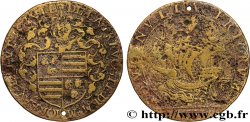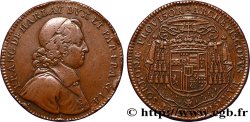E-auction 150-89346 - fjt_212328 - PARIS - ILE DE FRANCE François Harlay de Champvallon, Archevêque de Paris et proviseur de la Sorbonne n.d.
Devi Sign-in ed essere un offerente approvato fare un'offerta, Login per fare offerte. Conti sono soggetti ad approvazione e di approvazione sono raggiunti entro 48 ore. Non aspettare fino al giorno di una vendita si chiude per registrarti.Confermando la tua offerta su questo oggetto ti impegni ad un contratto legalmente vincolante per l'acquisto di questo prodotto e fare clic su «offerta» costituisce accettazione dei termini di utilizzo de e-auctions cgb.fr.
Offerta deve essere collocato in euro gli importi interi vendita only.The si chiuderà al momento sulla descrizione dell'oggetto, eventuali offerte pervenute al sito dopo l'orario di chiusura non verranno eseguite. Volte transmition possono variare e le offerte potrebbero essere respinto se si attende per gli ultimi secondi. Per ulteriori informazioni ckeck le FAQ.
SENZA COSTI PER GLI ACQUIRENTI.
SENZA COSTI PER GLI ACQUIRENTI.
| Valutazione : | 58 € |
| Prezzo : | 22 € |
| Offerta maxima : | 42 € |
| Data di fine vendita : | 29 febbraio 2016 19:04:00 |
| partecipanti : | 5 partecipanti |
Tipo : François Harlay de Champvallon, Archevêque de Paris et proviseur de la Sorbonne
Data: n.d.
Metallo : rame rosso
Diametro : 29 mm
Asse di coniazione : 6 h.
Orlo : lisse
Grado di rarità : R1
N° nelle opere di riferimento :
Diritto
Titolatura diritto : FRANC DE HARLAY DVX ET PAR FRANCIAE.
Descrittivo diritto : Buste de François de Harlay.
Rovescio
Titolatura rovescio : ARCHIEPISCOPVS PARISIENSIS ET SORBONAE PROVISOR.
Descrittivo rovescio : Armes de Fr. de Harlay avec le chapeau.
Traduzione rovescio : Archevêque de Paris et proviseur de la Sorbonne.
Commento
François Harlay de Champvallon, dit aussi François III de Harlay, né à Paris le 14 août 1625 et mort à Conflans le 6 août 1695, est un prélat français.
Il est abbé de Jumièges en 1648. Député de Normandie à l’assemblée du clergé, il est nommé archevêque de Rouen en 1651, à l'âge de vingt-cinq ans, suite au renoncement au siège de François II de Harlay.
En 1666, il prononce l'oraison funèbre de la reine-mère Anne d'Autriche.
En 1670, il est nommé archevêque de Paris et obtient le premier que le titre de duc et pair soit attaché à ce siège. Commandeur des ordres du roi, il préside l’assemblée du clergé en 1660. Il célèbre le mariage secret de Louis XIV et de Madame de Maintenon, dont il aurait interdit la publication, et prend part à la révocation de l’édit de Nantes.
En 1671, il est préféré à Bossuet (pour « des motifs de convenance », dit le cardinal de Bausset) pour remplacer à l’Académie française Hardouin de Péréfixe de Beaumont, son prédécesseur à l’archevêché de Paris, mais il perd la feuille des bénéfices au profit de François d'Aix de La Chaise, jésuite et confesseur du roi.
Dans l'affaire de la régale, il soutient la cause royale contre Camille de Neufville de Villeroy, primat des Gaules, qui a pris le parti de Rome. Il lutte contre les jansénistes de Port-Royal et il est l'un des inspirateurs de la politique anti-protestante de Louis XIV.
Harlay refusa la sépulture religieuse de Molière.
Pour sa biographie complète mais qui ne cite pas son titre en Sorbonne et répète en revanche les critiques du temps :
http://fr.wikipedia.org/wiki/Fran%C3%A7ois_Harlay_de_Champvallon.
François Harlay de Champvallon, also known as François III de Harlay, born in Paris on August 14, 1625 and died in Conflans on August 6, 1695, is a French prelate.
He was abbot of Jumièges in 1648. Deputy of Normandy in the assembly of the clergy, he was appointed archbishop of Rouen in 1651, at the age of twenty-five, following the renunciation of the seat by François II de Harlay.
In 1666, he delivered the funeral oration for the Queen Mother Anne of Austria..
In 1670, he was appointed Archbishop of Paris and was the first to obtain the title of Duke and Peer attached to this seat.. Commander of the King's Orders, he presided over the assembly of the clergy in 1660. He celebrated the secret marriage of Louis XIV and Madame de Maintenon, the publication of which he allegedly forbade, and took part in the revocation of the Edict of Nantes..
In 1671, he was preferred to Bossuet (for \\\"reasons of convenience\\\", says Cardinal de Bausset) to replace Hardouin de Péréfixe de Beaumont, his predecessor at the Archbishopric of Paris, at the French Academy, but he lost the benefices to François d'Aix de La Chaise, Jesuit and confessor to the king..
In the matter of the regalia, he supported the royal cause against Camille de Neufville de Villeroy, primate of the Gauls, who had sided with Rome.. He fought against the Jansenists of Port-Royal and was one of the inspirations behind the anti-Protestant policy of Louis XIV..
Harlay refused Molière's religious burial.
For his complete biography, which does not cite his title at the Sorbonne and instead repeats the criticisms of the time: http://fr. Wikipedia. org/wiki/Fran%C3%A7ois_Harlay_de_Champvallon
Il est abbé de Jumièges en 1648. Député de Normandie à l’assemblée du clergé, il est nommé archevêque de Rouen en 1651, à l'âge de vingt-cinq ans, suite au renoncement au siège de François II de Harlay.
En 1666, il prononce l'oraison funèbre de la reine-mère Anne d'Autriche.
En 1670, il est nommé archevêque de Paris et obtient le premier que le titre de duc et pair soit attaché à ce siège. Commandeur des ordres du roi, il préside l’assemblée du clergé en 1660. Il célèbre le mariage secret de Louis XIV et de Madame de Maintenon, dont il aurait interdit la publication, et prend part à la révocation de l’édit de Nantes.
En 1671, il est préféré à Bossuet (pour « des motifs de convenance », dit le cardinal de Bausset) pour remplacer à l’Académie française Hardouin de Péréfixe de Beaumont, son prédécesseur à l’archevêché de Paris, mais il perd la feuille des bénéfices au profit de François d'Aix de La Chaise, jésuite et confesseur du roi.
Dans l'affaire de la régale, il soutient la cause royale contre Camille de Neufville de Villeroy, primat des Gaules, qui a pris le parti de Rome. Il lutte contre les jansénistes de Port-Royal et il est l'un des inspirateurs de la politique anti-protestante de Louis XIV.
Harlay refusa la sépulture religieuse de Molière.
Pour sa biographie complète mais qui ne cite pas son titre en Sorbonne et répète en revanche les critiques du temps :
http://fr.wikipedia.org/wiki/Fran%C3%A7ois_Harlay_de_Champvallon.
François Harlay de Champvallon, also known as François III de Harlay, born in Paris on August 14, 1625 and died in Conflans on August 6, 1695, is a French prelate.
He was abbot of Jumièges in 1648. Deputy of Normandy in the assembly of the clergy, he was appointed archbishop of Rouen in 1651, at the age of twenty-five, following the renunciation of the seat by François II de Harlay.
In 1666, he delivered the funeral oration for the Queen Mother Anne of Austria..
In 1670, he was appointed Archbishop of Paris and was the first to obtain the title of Duke and Peer attached to this seat.. Commander of the King's Orders, he presided over the assembly of the clergy in 1660. He celebrated the secret marriage of Louis XIV and Madame de Maintenon, the publication of which he allegedly forbade, and took part in the revocation of the Edict of Nantes..
In 1671, he was preferred to Bossuet (for \\\"reasons of convenience\\\", says Cardinal de Bausset) to replace Hardouin de Péréfixe de Beaumont, his predecessor at the Archbishopric of Paris, at the French Academy, but he lost the benefices to François d'Aix de La Chaise, Jesuit and confessor to the king..
In the matter of the regalia, he supported the royal cause against Camille de Neufville de Villeroy, primate of the Gauls, who had sided with Rome.. He fought against the Jansenists of Port-Royal and was one of the inspirations behind the anti-Protestant policy of Louis XIV..
Harlay refused Molière's religious burial.
For his complete biography, which does not cite his title at the Sorbonne and instead repeats the criticisms of the time: http://fr. Wikipedia. org/wiki/Fran%C3%A7ois_Harlay_de_Champvallon








 Segnalare un errore
Segnalare un errore Stampate la pagina
Stampate la pagina Condividi mia selezione
Condividi mia selezione Fai una domanda
Fai una domanda Consegnare / vendere
Consegnare / vendere
 Descrittivo
Descrittivo










